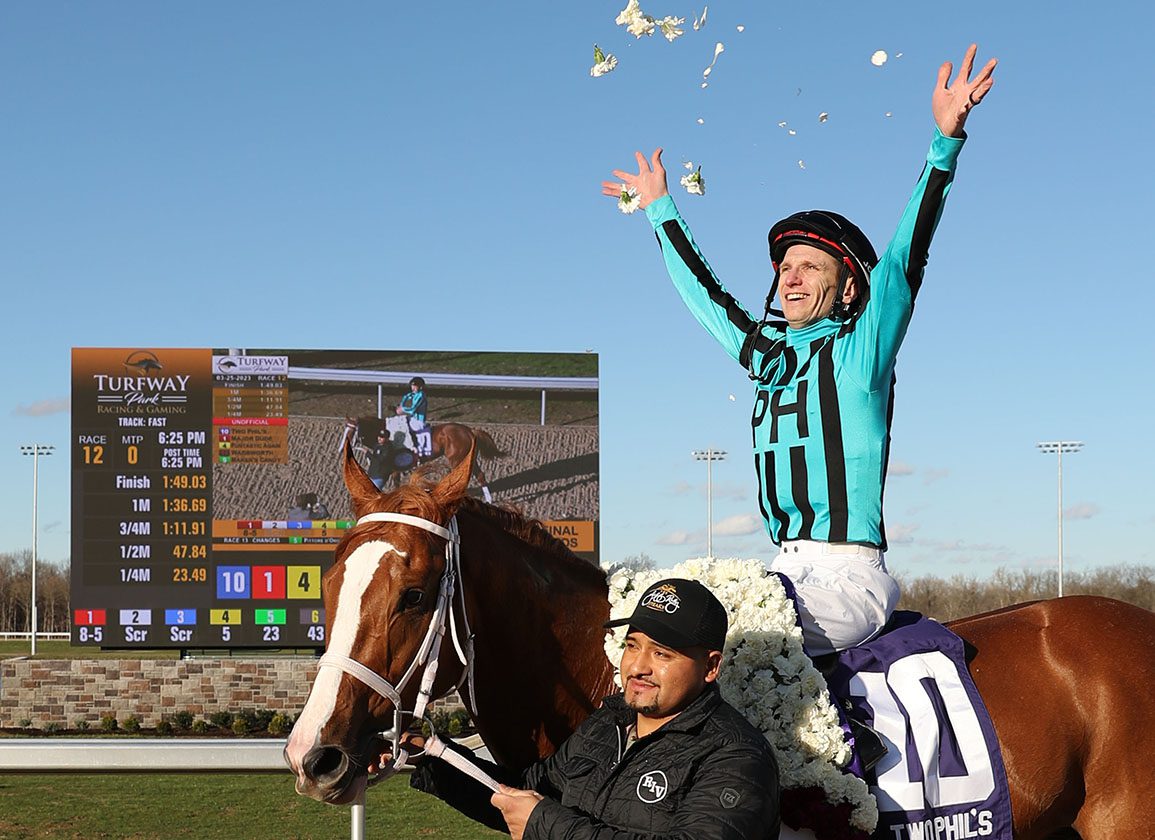The colt had been getting a little fractious in the gate and now he half sat down: too low for Jareth Loveberry to climb out, but not low enough to scramble underneath. “Get me out!” the jockey hollered. He was just trying to lift himself clear when his mount came back up and pinned a calf against the steel. The pain was excruciating. It was only five seconds or so before they got the gate open but that was enough, as they stretched him out, for the agony to be instantly submerged beneath a still keener anguish.
“I’m laying on the ground and I’m like, ‘Oh no, oh my gosh, could I miss my opportunity?’” he recalls now. “For all the pain, that’s what I’m thinking about. ‘Man, am I going to miss my opportunity?’”
Opportunity, note: singular not plural. For jockeys, chances come and go, and eventually tend to establish a familiar spectrum. At 35, Loveberry has ridden close to 13,000 races but had only had two Grade III winners before he won a Colonial Downs maiden last summer on a Hard Spun colt trained by Larry Rivelli. The partnership followed up in a stakes at Canterbury Park, and then tested much deeper water in the GI Breeders’ Futurity S. at Keeneland in October. Starting rank outsiders, they duly finished seventh behind crop leader Forte (Violence). Yet it was only then, paradoxically, that Loveberry recognized that single, elusive opportunity: the horse that could break the ceiling that congeals and closes over most journeyman careers.
“He got beat,” Loveberry acknowledges. “But you learn a lot in defeat, and I loved him more that day than in his wins. He was jostled around really hard, and he wasn’t sure about it. Down the backside, he’d dropped the bit. I’m like, ‘Okay, did you just shut off because you’re done fighting me, or are you just done?’ And then we’re coming around the second turn and I just picked the bridle up on him a little bit and he took off again.”
Not done, then.
“Something just clicked,” Loveberry continues. “He did get tired, but I’m thinking for the first time we’ve got something here. If we can just get him back, behind horses, he relaxes. And afterwards I was like, ‘Larry, this horse is… nice. He’s a lot better horse than we thought.’”
Sure enough, Two Phil’s has since made us all get used to that rogue apostrophe. He won the GIII Street Sense S. by five lengths plus, over the same surface that will stage the GI Kentucky Derby in a couple of weeks’ time; and podium finishes in two of the Fair Grounds trials this winter convinced Loveberry that Two Phil’s was indeed maturing into a credible Derby candidate. Moreover the jockey was himself sharing the momentum, standing second in the meet standings. But suddenly here he was, three weeks before the horse’s final prep in the GIII Jeff Ruby S. at Turfway, lying on his back with a horrible suspicion that he had broken his leg.
“Yeah, I couldn’t sleep that night—for a couple of reasons,” Loveberry recalls. “Because of the pain, but also just thinking that I was going to miss this horse, miss my opportunity. Did I need to pack everything in New Orleans, come home? So next morning I saw the specialist. It was nerve-racking, going in there, it hurt really bad. My boot was putting a lot of pressure where the fracture was. But taking that off relieved it a lot. Maybe there was a hope against hope.”
Yes, there was. They took an X-ray of the fibula, and it proved to be a hairline fracture. “Look,” said the specialist. “It’s not bad. You can start putting weight on it and get around and I’ll see you in a couple of weeks.”
In the meantime, inevitably, the vultures were circling. “Man, are you going to make it back?” Rivelli asked.
Loveberry was as reassuring as possible.
“Well, we got some phone calls!” replied Rivelli. “But I’m holding out for you.”
A week after the accident, Loveberry saw another specialist back home in Chicago. The bone had healed so well that the very next morning he went out and breezed Two Phil’s at Hawthorne. When he came in, Rivelli said: “All right, now I can tell everybody you’re riding him.”
So while Loveberry was still riding in a brace even this week, and still tender, this had turned out the most literal of lucky breaks. Because Two Phil’s duly won the Jeff Ruby with such authority that many people are wondering whether he can become the second consecutive Derby winner to graduate from that synthetic trial.
Certainly he certainly goes into the Derby as the undisputed blue-collar rooting interest. The horse is a yearling buyback, named for two octogenarian Phils in the ownership group. Rivelli, a stalwart of the Midwest circuit, would be within his rights to stand in the Churchill winner’s circle and berate the track’s owners for closing his spiritual home at Arlington. And all you need to know about Loveberry himself is the advice he always gives to aspiring young jockeys: “Work your ass off to get there—and when you get there, work harder.”
But while he will bring all due humility to the giddiest opportunity of his life, he will not suffer the slightest vertigo.
“Looking back, it’s crazy: to go from a five-eighths bull-ring to the Kentucky Derby,” he admits. “In between it’s been 18 years of just riding all over the place, different spots, different class levels. But I think that has made me what I am, starting from the bottom.”
The bull-ring was Great Lakes Downs in Michigan.
“It was only open for maybe 10 years, but that’s where I started racing in 2005,” he recalls. “I’d walked across the street to a horse farm when I was 12 years old, just for a summer job cleaning stalls. They had Thoroughbreds, and I started getting on them when I was 14. And just fell in love. You can’t really explain it. My dad’s in construction, my mom’s in banking. But I just felt comfortable around those horses. It just works. I like going around, seeing my horses every day. I feed them peppermints, I graze them, whatever I can do to help them out.”
On these foundations, a guy who started out in college to become an architect has built a career that has so far yielded 1,759 winners. Many were eked out at the basement level, from Ohio to Oklahoma; but he has made incremental gains in quality, especially over the past couple of years. In 2021, for instance, he tipped $3 million for the first time at a win ratio of 23 percent; while last year he broke into the top 50 riders nationally with earnings exceeding $5 million.
So while Loveberry also had the rug pulled from under his feet by the closure of Arlington, his success in the Fair Grounds colony has now opened the door to the Kentucky circuit. And the Two Phil’s adventure is certainly all the sweeter for the involvement of such a longstanding ally.
“It really is,” Loveberry says. “I’ve been riding for Larry since 2011 and he’s just a great guy. So with him having been so loyal to me, and me trying to be as loyal as I can to him too, it’s great for us both to be going to our first Derby together. Larry is tough to ride for, but great to ride for. I mean, you obviously want him to be tough, because you want to win: he works hard, he’s there at the barn all the time, and he’s really good at placing his horses. Once he finds a good horse, he really manages that horse, always picks the right spots to develop them. Instead of doing it like a machine, I guess. He has great help at the barn, too, they really focus on the horse.”
Two Phil’s, as such, is a typical project. Though actually unavailable for his debut, Loveberry has been part of the horse’s development from his earliest works. And, just like his jockey, Two Phil’s has the kind of seasoning that is increasingly uncommon in the Derby field. With so many contenders nowadays arriving on a light schedule, Two Phil’s will be a relatively gritty veteran of eight starts.
“I think that’s very beneficial for him,” Loveberry emphasizes. “Having experienced so many different races and surroundings, he’s going to be a well-rounded horse. He’s been in tight. He’s been in front, and farther off of it. He’s been in slop. He’s really seen a lot of different things, and that maturity will help in a spot like that. Because he has just kept developing. He was green early on, and can get a little quirky, but I’ve learned about him over the last year and now he’s able to shut off and give that high cruising speed, which I think his daddy had too.
“At Fair Grounds he had a three-month layoff from the Street Sense to the [GIII] Lecomte S. He got tired in that race but ever since I’ve been like, ‘Man, Larry, he’s getting better and getting smarter all the time.’ And in the Jeff Ruby he put it all together. I don’t think it was about the surface. He’s won on dirt, wet dirt, synthetic. A good horse will run on anything, and he’s proven thatAnd I just think he’s peaking at the right time.”
Likewise his jockey, who rode with all due verve and confidence at Turfway.
“I was just sitting and sitting, and looking for the one [favorite Major Dude (Bolt d’Oro)],” Loveberry recalls. “I see him make a bit of a move on the inside, so I just gave him a little smooch and he did the rest. His gallop out that day, the outrider had to help pull me up, he was really full of himself.”
Actually the outrider’s horse slammed right into his injured leg. Ouch. But the man they call “J Love”—as stitched into his breeches—hardly needed that jolt to remain grounded. As a family man, with two young kids, nothing is going to skew his priorities at this stage.
“I think I’ve had some good opportunities to help get me to this spot,” Loveberry says, contemplating the 20-horse stampede ahead. “I’ve learned from other riders that have been through it, they’ve given me pointers here and there. But I’ve never looked at any race and said, ‘Oh, I have to win that for my career.’ Obviously you want to win the Kentucky Derby. All eyes are on it. But is it the be-all and end-all? No. If we just put our best foot forward, keep level-headed, I think that goes a long ways. When you start overthinking it, that’s when you start making mistakes. So let’s just keep headed in the right direction, and hope he’s healthy going in the race.”
But the reason he won’t be getting ahead of himself, the reason he will be staying calm, is also the reason to be excited.
“I mean, it’s horse racing,” Loveberry says, with a shrug and a smile. “Anything could happen.”
The post From Great Lakes Downs to the Derby appeared first on TDN | Thoroughbred Daily News | Horse Racing News, Results and Video | Thoroughbred Breeding and Auctions.







